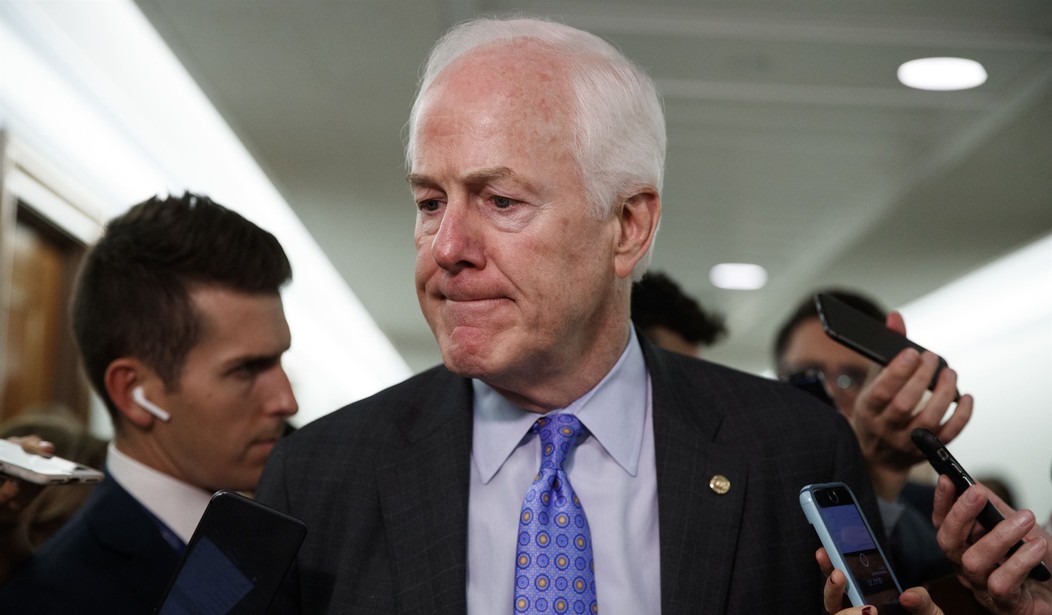There’s an interesting pair of stories out tonight on the state of negotiations, similar on the substance but with sharply different spin. Politico reports that the two sides are still talking and that Senate conservatives have been surprisingly restrained about raising objections, preferring a wait-and-see approach this time. They’re not ruling out a deal preemptively, as the might have in the past. “I’m a gun owner and I use them a lot. And I think it hurts the Second Amendment over time if you don’t do the stuff [that] makes sense,” said Mike Braun of Indiana. Maybe this time really is different.
WaPo agrees that the two sides are still talking but takes a more pessimistic view, noting that conservatives have begun to object to the key plank in the emerging bill. Both parties acknowledge that a federal red-flag law isn’t happening but in lieu of that they’ve discussed making federal money available to states to help them set up their own red-flag programs. No state has to accept that money, of course. It’s simply a financial inducement to ease the administrative burden of developing a new legal mechanism to prevent dangerous people from buying guns.
Not going to happen, say some Republicans.
[John] Barrasso said Thursday that “there is no role of the federal government for red-flag laws,” ruling out even a federal program that would merely encourage rather than mandate them. “Wyoming is never going to pass one, and it is a state’s decision,” he said.
Speaking on the House floor Thursday, moments before lawmakers there passed a red-flag bill, [Jim] Jordan questioned “why Republican senators are pushing this” and “trying to bribe states to implement this.” He said, “We know what this thing is going to look like and how it’s going to violate due process. I hope they will come to their senses and stand up for the law-abiding American citizens and their fundamental liberties and vote this thing down.”…
Other conservatives who voiced opposition included Sen. Bill Hagerty (R-Tenn.), who noted a red-flag law in New York did not prevent the May 14 mass shooting in a Buffalo supermarket that left 10 dead, as well as Sen. Roger Marshall (R-Kan.), who called any red-flag provision a “poison pill” for any Senate deal. “I don’t see how a red-flag law passes up here,” he said. “I think it’s an infringement on the Second Amendment, and just like I’m standing up and fighting to protect our freedoms of speech and our freedoms of religion, I’m going to stand up and protect our Second Amendment.”
None of that is a deal-killer in and of itself since Schumer needs just 10 Republicans to pass something. For instance, along with the usual centrist suspects like Susan Collins and Lisa Murkowski, Thom Tillis and Bill Cassidy sound open to red-flag grants so long as due-process concerns are addressed. But you know how politics works: Some conservative Republicans who might momentarily be receptive to the grant idea might get cold feet if a backlash begins to form on the right. One of the key negotiators is Lindsey Graham; is Graham likely to push ahead if MAGAworld suddenly decides he’s a RINO traitor if he pursues this?
If he and Cornyn drop out, depriving the rest of the caucus of political cover, how many others drop out with them?
Schumer and Chris Murphy are hoping to strike a deal that’s broadly popular, capable of attracting 20 or more Republicans. The fact that even caucus leaders like Barrasso are speaking out against the grant program could knock that number down quickly, imperiling the grant provision. And if the grant provision collapses, the whole deal might collapse. It’s the guts of the bill, after all, especially now that Cornyn has ruled out raising the minimum age to purchase an AR-15 to 21. If the grant program falls apart, virtually the only thing left in the compromise will be expanding the background-check system to include more information on underaged offenses and appropriating some money for mental health treatments.
Will Democrats agree to that deal? They’re willing to take half a loaf or even a quarter loaf this time for the sake of getting something done, but that would amount to a single slice of bread.
Murphy hinted that there might be 10 Republican votes to raise the minimum purchase age for rifles to 21. “We’re counting heads right now to see what we have…60-plus votes for. There’s clearly a lot of interest in that range of individuals from 18-20,” he told the WSJ. But that raises a question: Since Cornyn is the lead negotiator and he opposes that provision, will the GOP demand that it be stripped out of the final bill? Or will Schumer and Murphy attempt to go over Cornyn’s head and force a floor vote on the age-limit provision, potentially fracturing negotiations?
There’s risk for Republicans in opposing raising the age limit, writes Tim Miller. Not only is that proposal popular, polling at 74 percent (including 59 percent among Republicans) in yesterday’s Quinnipiac poll, it’s really easy to form an effective attack line about it.
This is a very simple issue to “message.” The notion that high schoolers can access a semiauto but not a White Claw is much easier to understand than the endlessly multiplying subtleties of the background-check debate. Picture the ad featuring the nervous mom walking through a high school eyeing all the JV jocks, burnouts, and desperate wannabes carrying legal ARs; the MADD-style campaign writes itself. There’s also a built-in network of activists who don’t want these weapons in these kids’ schools.
On a recent episode of the “Next Level” podcast, Bulwark publisher Sarah Longwell made another smart point in support: If 18-year-olds can legally buy these guns, it’s much easier for their younger peers—15- or 16-year-olds, say—to get them, too, because they’re in class together. That dynamic goes away if the age threshold is raised to 21.
“Republicans want you to be 21 to buy cigarettes but only 18 to buy an assault rifle” is a hard one to counterspin.
I think in the end they’ll get 10 Republican votes for the red-flag grant program for the simple reason that the program … isn’t likely to work. I doubt any red state will enact a new red-flag law after Uvalde, whether or not federal money is available to pay for it, and they’re arguably less likely to do so once the federal government is perceived as pushing one on them. For that reason, the GOP gets to have its cake and eat it too here. By passing the grant program at the federal level, they get to say that they were willing to Do Something this time. And meanwhile the states will continue to do nothing, satisfying gun-rights advocates who object to even the most targeted restrictions on dangerous people.








Join the conversation as a VIP Member